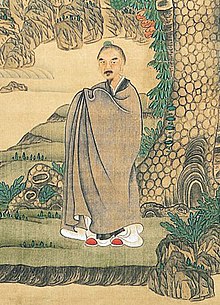Chen Hongshou
| Chen Hongshou | |||||||||

Self portrait of Chen Hongshou, 1635
|
|||||||||
| Traditional Chinese | 陳洪綬 | ||||||||
|---|---|---|---|---|---|---|---|---|---|
| Simplified Chinese | 陈洪绶 | ||||||||
|
|||||||||
| Transcriptions | |
|---|---|
| Standard Mandarin | |
| Hanyu Pinyin | Chén Hóngshòu |
| Wade–Giles | Ch'en Hung-shou |
Chen Hongshou (1598–1652), formerly romanized as Ch'en Hung-shou, was a Chinese painter of the late Ming dynasty.
Chen was born in Zhuji, Zhejiang province in 1598, during the Ming dynasty. His courtesy name was Zhanghou (章侯), and his pseudonyms were Laolian (老莲), Fuchi (弗迟), Yunmenseng (云门僧), Huichi (悔迟), Chiheshang (迟和尚) and Huiseng (悔僧). He once trained under Lan Ying, and was skilled in painting peculiar human figures, landscapes, flower-and-bird. He utilized plump, profound brushwork and precise color, creating a unique style. He always painted illustrations and made tapestry portraits. His two masterpieces," Shui Hu Ye Zi" (水浒叶子) and "Bo Gu Ye Zi", were the rare examples among the Ming and the Qing dynasties. He was very famous at that time, called "Chen in South and Cui in North", together with Cui Zizhong. He also was skilled in calligraphy,poetry and prose.
His works are kept in museums and galleries all over the world including these in the United States:
Appreciating Plums, Guangdong Provincial Museum
Man holding Ganoderma lucidum
An Elegant Gathering, Shanghai Museum
Drinking Wine in the Garden, Shanghai Museum
Landscape of Pine Valley, Shanghai Museum
Tao Yuanming, Honolulu Museum of Art
...
Wikipedia
